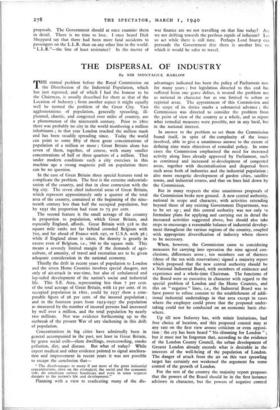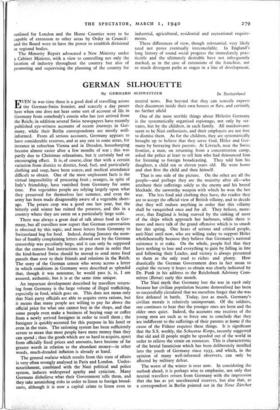THE DISPERSAL OF INDUSTRY
By SIR MONTAGUE BARLOW
THE central problem before the Royal Commission on the Distribution of the Industrial Population, which has just reported, and of which I had the honour to be the Chairman, is usually described for short as that of the Location of Industry ; from another aspect it might equally well be termed the problem of the Great City. Vast agglomerations of population, generally sprawling, ill- planned, chaotic, and congested over miles of country, are a phenomenon of the nineteenth century. Prior to 1800 there was probably no city in the world numbering a million inhabitants ; in that year London reached the million mark and has been steadily spreading since. Today the world can point to some fifty of these great concentrations of population of a million or more ; Great Britain alone has seven of them, together, of course, with many smaller concentrations of half or three quarters of a million. That under modern conditions such a city exercises in this machine age a strong magnetic pull on population there can be no question.
In the case of Great Britain three special features tend to complicate the problem. The first is the extreme industriali- sation of the country, and that in close connexion with the big city. The seven chief industrial areas of Great Britain, which represent approximately only a quarter of the total area of the country, contained at the beginning of the nine- teenth century less than half the occupied population, but by 1931 the proportion had risen to 73 per cent.
The second feature is the small acreage of the country in proportion to population, which Great Britain, and especially England, affords. Great Britain with 518 to the square mile ranks not far behind crowded Belgium with 702, and far ahead of France with 197, or U.S.A. with 36 ; while if England alone is taken, the density is greatly in excess even of Belgium, i.e., 766 to the square mile. This means a severely limited margin if the demands of agri- culture, of amenity, of travel and recreation are to be given adequate consideration in the national economy.
Thirdly the drift in recent years of population to London and the seven Home Counties involves special dangers, not only of air-attack in war-time, but also of unbalanced and lop-sided development of the nation's social and industrial life. This S.E. Area, representing less than 7 per cent. of the total acreage of Great Britain, with 12 per cent. of its occupied population in aor, could by 1937 show a com- parable figure of 26 per cent. of the insured population ; and in the fourteen years from 1923-1937 the population as measured by the number of insured persons had increased by well over a million, and the total population by nearly two millions. Nor was evidence forthcoming up to the outbreak of the present War of any slackening in this drift of population.
Concentrations in big cities have admittedly been in general accompanied in the past, not least in Great Britain, by grave social evils—slum dwellings, overcrowding, smoke pollution, dirt, and disease. But what of today? While expert medical and other evidence pointed to signal ameliora- tion and improvement in recent years it was not possible to escape the conclusion that- " The disadvantages in many if not most of the great industrial concentrations, alive on the strategical, the social and the economic side, do constitute serious handicaps and even in some respects dangers to the nation's life and development."
Planning with a view to eradicating many of the dis- advantages indicated has been the policy of Parliament now for many years ; but legislation directed to this end has suffered from one grave defect, it treated the problem not as national in character but as one limited to urban or regional areas. The appointment of this Commission and the scope of its duties marks a substantial advance ; the Commission was directed to consider the problem from the point of view of the country as a whole, and to report what remedial measures were possible, not in any local, but in the national interest.
In answer to the problem so set them the Commission found itself, in spite of the complexity of the issues involved, able to give a unanimous answer to the extent of defining nine main objectives of remedial policy. In some cases the Commission emphasised the need for increased activity along lines already approved by Parliament, such as continued and increased re-development of congested areas, together with decentralisation and dispersal from such areas both of industries and the industrial population ; also more energetic development of garden cities, satellite towns, and industrial estates, and that on lines laid down by the Commission.
But in many respects the nine unanimous proposals of the Commission broke new ground. A new central authority, national in scope and character, with activities extending beyond those of any existing Government Department, was to be set up ; and this central authority was not only to formulate plans for applying and carrying out in detail the increased activities suggested above, but should also take steps to encourage a reasonable balance of industrial develop- ment throughout the various regions of the country, coupled with appropriate diversification of industry where shown to be necessary.
When, however, the Commission came to considering measures for carrying into operation the nine agreed con- clusions, differences arose ; ten members out of thirteen (three of the ten with reservations) signed a majority report which proposed that the new central authority should be a National Industrial Board, with members of eminence and experience and a whole-time Chairman. The functions of the Board were so executive in character with regard to the special problem of London and the Home Counties, and this on " negative " lines, i.e., the Industrial Board was to have power to refuse consent to the establishment of addi- tional industrial undertakings in that area except in cases where the employer could prove that the proposed under- taking could not be conducted on an economic basis else- where.
Up till now Industry has, with minor limitations, had free choice of location, and this proposed control may at any rate on the first view arouse criticism or even opposi- tion ; the cry has been heard " No slimming for London " ; but it must not be forgotten that, according to the evidence of the London County Council, the urban development of Greater London already exceeds what is desirable in the interests of the well-being of the population of London. The danger of attack from the air on this vast sprawling target has certainly not weakened the argument for some control of the growth of London.
For the rest of the country the majority report proposes that the powers of the Board should be in the first instance advisory in character, but the powers of negative control outlined for London and the Home Counties were to be capable of extension to other areas by Order in Council: and the Board were to have the power to establish divisional or regional bodies.
The Minority Report advocated a New Ministry under a Cabinet Minister, with a view to controlling not only the location of industry throughout the country but also of promoting and supervising the planning of the country for industrial, agricultural, residential and recreational require- ments.
These differences of view, though substantial, very likely need not prove eventually irreconcilable. In England's long history of sound social progress the immediately prac- ticable and the ultimately desirable have not infrequently marked, as in the case of extensions of the franchise, not so much divergent paths as stages in a line of development.















































 Previous page
Previous page